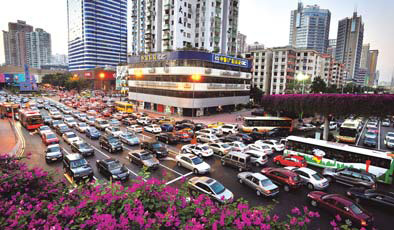Guangzhou releases traffic proposals
The government of Guangdong's provincial capital may raise parking fees this year and study possible congestion fees and restrictions of vehicles from outside the city during rush hours.
 |
|
Traffic slows to a halt in Guangzhou, capital of Guangdong province, on Dec 22, 2010. |
A draft of the 30 new measures to curb downtown traffic in the post-Asian Games period was released over the weekend. The city had ruled out restricting the issuance of new license plates, a policy Beijing had adopted.
Guangzhou has 2.15 million automobiles, including 1.61 million cars. The number of private cars had increased by 22.1 percent annually over the last five years, a rate exceeding Beijing's and Shanghai's, figures from Guangzhou commission of transport showed. About 300,000 new vehicles were licensed last year.
The average traffic speeds on the city's 60 main roads in September 2010 remained slower than 20 kilometers an hour during the evening rush hour. Authorities expected 60 percent of the main roads to be choked by 2013 if no measures are taken.
The drafted measures are intended to ensure average traffic speeds of at least 25 km an hour on major downtown roads in five years.
Authorities plan to increase parking fees, creating different standards for different locations and times.
They intend to develop systems enabling the public to share real-time information about 50 percent of downtown parking lots and make 30 percent of the lots open to reservations by 2013. This will reduce the number of vehicles driving around in search of parking.
More parking lots will be built around suburban subway stations to encourage drivers to take the subway into the city center.
Go to Forum >>0 Comments
 Add your comments...
Add your comments...
- User Name Required
- Your Comment
- Racist, abusive and off-topic comments may be removed by the moderator.
 0
0 






